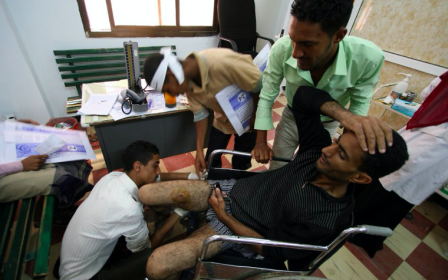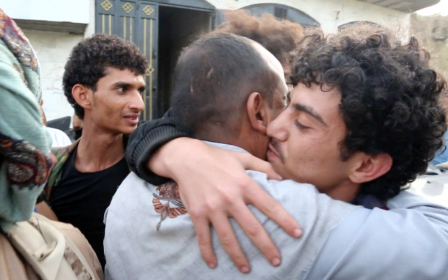Yemen troops launch offensive to try and re-take Taiz from the Houthis

Yemeni troops on Thursday launched a bid to break a rebel siege of Yemen's third-largest city of Taiz, with fierce fighting leaving five soldiers and 13 rebels dead, military sources said.
Soldiers attacked Houthi positions from the east, west and north of the flashpoint southwestern city that has been under siege for more than a year, they said.
One military source said the troops made "a relative breakthrough" by driving Houthis from several positions around the city.
A pro-government activist, Abdel Majid al-Dhababi, confirmed that troops had made progress.
He told AFP the army "practically succeeded in breaking the blockade from the west. But the road leading to Aden [to the south] is still unsafe and this is preventing civilians from fleeing south."
Tens of thousands of civilians are believed to be caught in the crossfire to retake the city and the surrounding countryside.
Also, on Thursday, 64 Houthi rebels were killed after being lured into an ambush by Saudi forces near the Yemeni-Saudi borders, the Saudi-led coalition said.
Houthi rebels apparently planned to attack the borders areas near Najran in Saudi Arabia before they were bombarded by artillery on the Saudi side of the border.
Apache helicopters contributed to the attack as more rebels were captured and their weapons seized.
The coalition also said Houthis executed 11 soldiers loyal to Saleh, blaming them for the ambush because of their "apathy and low level of observation”.
Yemen has been hit by unrest since the Houthis, a Shia minority previously largely concentrated in north Yemen, stormed the capital Sanaa in September 2014.
While peace talks were held, the Houthis then placed President Abd Rabbuh Mansur Hadi under house arrest and began marching south with the assistance of former president Ali Abdullah Saleh and his supporters.
The violence increased after a Saudi-led Arab coalition launched a military campaign last March to help shore up Hadi's government.
The government had fled to Saudi Arabia after the Houthis seized Sanaa, but pro-government forces have since recaptured the southern port city of Aden with the help of coalition air strikes and forces. However, the rise of militant groups including the Islamic State and al-Qaeda in the Arabian Peninsular (AQAP) that have exploited the power vacuum has made reinstating law and order difficult.
The United States considers AQAP to be al-Qaeda's deadliest franchise and has conducted a drone war against the group in Yemen.
The UN says more than 6,600 people, mostly civilians, have been killed since last March and more than 80 percent of the population needs humanitarian aid.
Stay informed with MEE's newsletters
Sign up to get the latest alerts, insights and analysis, starting with Turkey Unpacked
Middle East Eye delivers independent and unrivalled coverage and analysis of the Middle East, North Africa and beyond. To learn more about republishing this content and the associated fees, please fill out this form. More about MEE can be found here.




